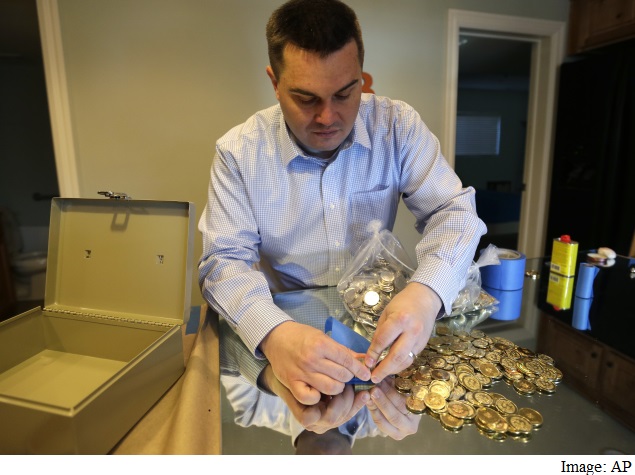- Home
- Internet
- Internet News
- Second Bitcoin Auction Draws Fewer Bidders
Second Bitcoin Auction Draws Fewer Bidders

The U.S. Marshals Service said Thursday that 11 registered bidders had taken part in the auction and that the agency had received 27 bids, far fewer than the 45 bidders and 63 bids the agency received in the first Bitcoin auction in June. The winner, or winners, of the second auction will be notified Friday by 5 p.m. Eastern time.
The auction Thursday was for 50,000 Bitcoins, worth around $19 million (roughly Rs. 117 crores), seized in connection with the now-defunct online marketplace Silk Road. The site was shut down in October 2013 after the authorities said it was a marketplace for illegal drugs and other illicit activities. In the auction five months ago, the Marshals Service sold nearly 30,000 Bitcoins.
The agency declined to comment further Thursday.
Some of the same prominent investors who participated in the Marshals Service's first auction again submitted bids this time. SecondMarket and Pantera Bitcoin both allowed customers to bid through syndicates. Tim Draper, the venture capitalist who was the first auction's sole winner, said he planned to participate in Thursday's auction.
But some bidders in the first auction chose to sit out Thursday. The Bitcoin Shop did not participate in the auction. Nor did Rangeley Capital. Alex Waters, the chief executive and co-founder of Coin Apex, who appeared to send his bid live on Bloomberg Television during the first auction, also did not bid this time. Coinbase, a Bitcoin payment processor, declined to comment.
The results of the Marshals Service's first auction may have dissuaded bidders from participating in the second auction, said Gil Luria, an analyst with Wedbush Securities.
"The big difference is that people already saw how last time went," Luria said.
Although the Marshals Service did not announce the price of Draper's winning bid, it is widely assumed among Bitcoin investors that he bid above Bitcoin's market price at the time. As a result, some investors who had hoped to get a bargain last time saw little point in participating in this auction. Bitcoin is now trading at around $370 (roughly Rs. 22,500), down from about $570 (roughly Rs. 34,700) at the start of the June auction.
"Unless you can get a steep discount to market, it's a lot of risk," said Charles Allen, the chief executive of the Bitcoin Shop. "If we're not going to get a discount, what's the point?"
Winklevoss Capital, a start-up venture firm started by the Winklevoss twins, did not participate in either auction.
"We don't generally participate in auctions where there is limited information, a high likelihood of a winner's curse and a low likelihood of achieving an efficient price. That being said, anything can happen and we wish the participants the best of luck," Cameron Winklevoss said in a statement Thursday.
The latest auction is for Bitcoins found on computer hardware belonging to Ross Ulbricht, who is accused of creating Silk Road. Prosecutors and Ulbricht agreed in January that the government could sell the virtual currency it had seized.
The government's two auctions represent only a small fraction of the total amount of Bitcoins seized in connection with Silk Road. Including 144,336 Bitcoins found on computer hardware belonging to Ulbricht, the government has recovered 173,991 Bitcoins. A spokeswoman for the Marshals Service, Lynzey Donahue, said in an email at the time the second auction was announced that the agency anticipated selling the remaining Bitcoins, but that "no exact dates have been determined."
© 2014 New York Times News Service
Get your daily dose of tech news, reviews, and insights, in under 80 characters on Gadgets 360 Turbo. Connect with fellow tech lovers on our Forum. Follow us on X, Facebook, WhatsApp, Threads and Google News for instant updates. Catch all the action on our YouTube channel.
Related Stories
- Samsung Galaxy Unpacked 2026
- iPhone 17 Pro Max
- ChatGPT
- iOS 26
- Laptop Under 50000
- Smartwatch Under 10000
- Apple Vision Pro
- Oneplus 12
- OnePlus Nord CE 3 Lite 5G
- iPhone 13
- Xiaomi 14 Pro
- Oppo Find N3
- Tecno Spark Go (2023)
- Realme V30
- Best Phones Under 25000
- Samsung Galaxy S24 Series
- Cryptocurrency
- iQoo 12
- Samsung Galaxy S24 Ultra
- Giottus
- Samsung Galaxy Z Flip 5
- Apple 'Scary Fast'
- Housefull 5
- GoPro Hero 12 Black Review
- Invincible Season 2
- JioGlass
- HD Ready TV
- Latest Mobile Phones
- Compare Phones
- Tecno Pova Curve 2 5G
- Lava Yuva Star 3
- Honor X6d
- OPPO K14x 5G
- Samsung Galaxy F70e 5G
- iQOO 15 Ultra
- OPPO A6v 5G
- OPPO A6i+ 5G
- Asus Vivobook 16 (M1605NAQ)
- Asus Vivobook 15 (2026)
- Brave Ark 2-in-1
- Black Shark Gaming Tablet
- boAt Chrome Iris
- HMD Watch P1
- Haier H5E Series
- Acerpure Nitro Z Series 100-inch QLED TV
- Asus ROG Ally
- Nintendo Switch Lite
- Haier 1.6 Ton 5 Star Inverter Split AC (HSU19G-MZAID5BN-INV)
- Haier 1.6 Ton 5 Star Inverter Split AC (HSU19G-MZAIM5BN-INV)







![[Partner Content] OPPO Reno15 Series: AI Portrait Camera, Popout and First Compact Reno](https://www.gadgets360.com/static/mobile/images/spacer.png)









